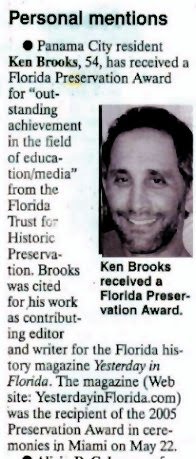Here's a quiz for you: What do Jesse Owens and Primo Carnera have in common?
If you answered, "Both were world champions in the 1930s," you're only partly correct. Sure, Owens won four gold medals for track at the 1936 Olympics in Munich. And yes, Italy's Carnera held boxing's heavyweight crown in 1933.
There's more. Both men were forced by hard times to barnstorm for small-change once their athletic careers were finished. And both men brought their barnstorming acts to Panama City, Florida.
In 1936, Jesse Owens returned to America a conquering hero, but found few job opportunities. A promoter offered to send Owens on a nationwide tour of ballparks in which he would race a horse around the bases. "You can't eat gold medals, " Owens said, and accepted.
Owens came to Panama City's Pelican Park--at the time the home of Panama City's minor league Class-D ballteam, the Pelicans--in the fall of 1939.
"I was working for Royal-Crown Cola," retired local businessman Tom Bingham told me, "and we promoted the event. They brought in a big white horse; the starter fired the gun and Jesse took off, beating the horse by a wide margin. The horse couldn't turn the corners like Jesse could." A crowd of nearly five-hundred paid twenty-five cents apiece. Jesse's take was a hundred dollars.
Primo Carnera came to Panama City as a wrestler--not a boxer--on July 29, 1954. The mobsters who'd controlled his boxing career had left the six-foot-seven-inch "Ambling Alp" destitute. A wrestling promoter offered Carnera $200 per match, and Carnera accepted.
The forty-eight-year old Carnera didn't do much in his bout at Panama City's old Civic Center. "Slow but exciting," reported the Panama City News-Herald. The fight ended the way all of Carnera's matches were scripted. The champ threw a "punch" that "knocked out" his opponent.
For Owens and Carnera--two athletes forced by life's exigencies to exploit a faded fame--the story has a happy ending. Before his death in 1980 Owens had transformed himself into a highly-sought, well-paid motivational speaker. Carnera saved enough money from wrestling to put a son through medical school. Before he died in 1967, Carnera fullfilled his dream and became a naturalized American citizen.
--Ken Brooks
Panama City News Herald, Aug. 1, 2000
skip to main |
skip to sidebar

Jesse Owens

Panama City Herald, July 24, 1954

Carnera, winning boxing's biggest title

Carnera on mat, not getting the best of this exchange

The Olympic star and the heavyweight champion...
Jesse Owens and Primo Carnera come to the Florida panhandle. BY KEN BROOKS.

Jesse Owens

Panama City Herald, July 24, 1954

Carnera, winning boxing's biggest title

Carnera on mat, not getting the best of this exchange